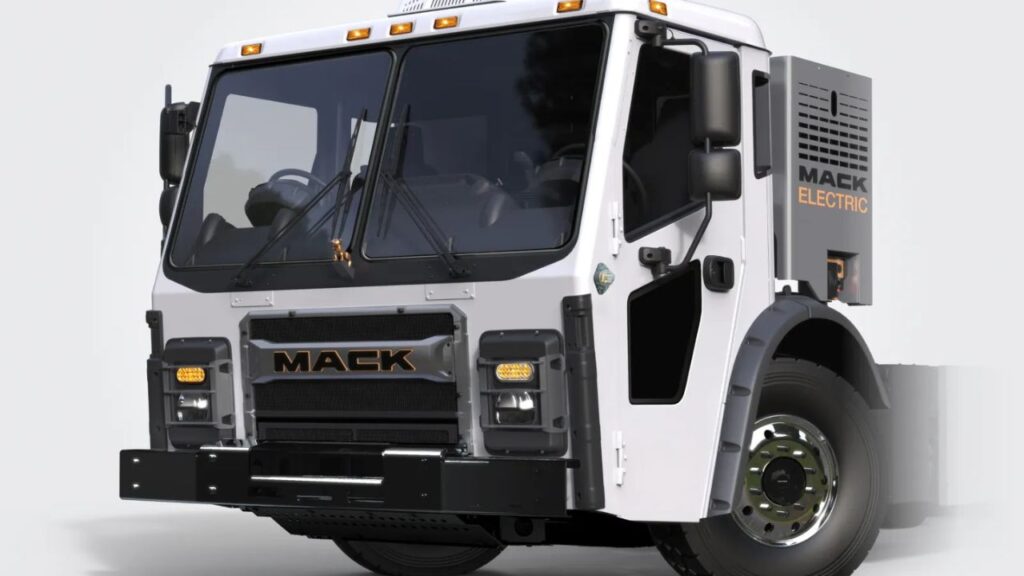In a groundbreaking move towards sustainable waste management, Madison, Wisconsin, has emerged as a pioneer in environmental consciousness by introducing the state’s first electric garbage trucks. The city has deployed two Mack Electric LR HDEV Class 8 vehicles, marking a significant milestone in Wisconsin’s journey towards zero-emission public services.
Madison Bold Step Towards Carbon Neutrality
The introduction of these electric refuse trucks aligns perfectly with Madison’s ambitious environmental goals set in 2017, when it joined 24 other North American cities in pledging to achieve zero-net carbon emissions for city operations by 2030 and citywide by 2050. These heavy-duty electric vehicles represent more than just new additions to the fleet; they symbolize Madison’s commitment to revolutionary change in urban waste management.
Mack Electric LR Technical Specifications: Power Meets Sustainability
The new Mack Electric LR HDEVs boast impressive specifications:
| Feature | Specification |
|---|---|
| Motor Output | 400 kW (536 hp) combined |
| Peak Torque | 4,051 lb-ft |
| Battery Capacity | 376 kWh |
| Charging Time | Under 2 hours (at 150 kW) |
| Charging System | ChargePoint DCFC dispensers |
| Vehicle Class | Class 8 Heavy-Duty |
| Transmission | 2-speed Mack Powershift |
Environmental Impact and Community Benefits
Mayor Satya Rhodes-Conway emphasizes the direct community benefits: “These refuse trucks visit every block in Madison. Replacing diesel trucks with electric alternatives significantly reduces neighborhood air pollution.” The impact is particularly noteworthy as garbage trucks make frequent stops and operate throughout residential areas.
Madison’s Broader Electric Vehicle Strategy
The city’s commitment to electrification extends beyond just garbage trucks:
- Current fleet includes over 100 fully electric vehicles
- 150 hybrid vehicles in service
- 62 new electric buses for rapid transit system
- Plans to add two more electric garbage trucks
Economic and Operational Benefits

The transition to electric trucks offers multiple advantages:
- Elimination of fossil fuel costs
- Reduced maintenance expenses
- Overnight charging capability at the city depot
- Enhanced operational efficiency
- Lower noise pollution in residential areas
Expert Opinion
Dr. James Martinez, Environmental Engineering Professor at the University of Wisconsin-Madison, shares his perspective: “Madison’s adoption of electric garbage trucks represents a crucial step in municipal fleet electrification. The high torque output of these vehicles makes them ideal for stop-and-go refuse collection, while their zero-emission operation significantly improves urban air quality. This initiative could serve as a model for other mid-sized cities looking to reduce their carbon footprint.”
Future Implications and Industry Impact
This initiative positions Madison as a leader in sustainable municipal operations and provides valuable data for other cities considering similar transitions. The success of these electric garbage trucks could accelerate the adoption of heavy-duty electric vehicles in municipal fleets across North America.
Making History in America’s Dairyland
As the first Class 8 battery-electric vehicles deployed in Wisconsin, these trucks represent more than just new equipment – they’re a testament to Madison’s forward-thinking approach to environmental stewardship and public service. The city’s experience with these vehicles will provide crucial real-world performance data that could influence municipal fleet decisions nationwide.
The deployment of these electric garbage trucks in Madison marks a significant milestone in municipal sustainability efforts. As cities worldwide grapple with environmental challenges, Madison’s initiative provides a practical blueprint for transitioning essential services to zero-emission alternatives. With plans for further expansion and a comprehensive approach to fleet electrification, Madison is setting new standards for sustainable urban operations in the United States.

